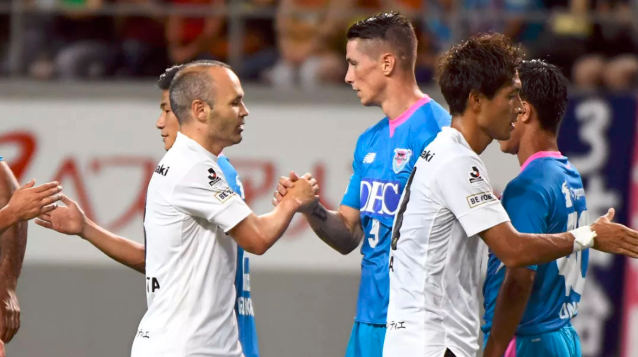J League will not limit foreign aid
2018-12-21 11:21:52
作者:Football
阅读数:
我要发言(0)
收藏本文
Starting from the 2019 season, there will be no restrictions on the number of foreign aid registrations in the J1, J2, and J3 leagues The number of foreign aids in each team will be changed to J1, and 5 players per game J2 and J3 can play 4 players per game
The world's best news: The same is true today, the Japanese J League announced the next season's rules, the most striking change is the increase in foreign aid quotas. Starting from the 2019 season, there will be no restrictions on the number of foreign aid registrations in the J1, J2, and J3 leagues. The number of foreign aids in each team will be changed to J1, and 5 players per game. J2 and J3 can play 4 players per game.

Not only that, the players from the AFC Football Association (known as the host country in Japan) who signed the friendly cooperation agreement between the eight and J-Leagues did not count foreign aid in the J-League (similar to the EU player policy), owning and The same treatment for Japanese players, the eight football associations are Thailand, Vietnam, Myanmar, Cambodia, Singapore, Indonesia, Malaysia and Qatar. In this year's competition, the Kobe Victory Fleet with Iniesta once sent eight players including foreign aid and foreign aid.

According to the new regulations, in theory, as long as the club is willing, it can send a lineup of 11 players who are all composed of foreign aid and supporting players. Therefore, in order to prevent the retreat of Japanese youth training, the J League also announced a new "Home Grown" policy, that is, the team must have two "local players" in the league list, and the future will be yearly. increase.
Japanese Football Association's identification of local players
1. Players who have registered for more than 3 seasons or 36 months in the club between the ages of 12 and 21 (including seasons of 12 years old and seasons of 21 years old)
2. Time does not require continuous
3. Players under the age of 21 are still considered to be players of the original club when they are rented out for a certain period of time.
4. Players regardless of nationality, regardless of occupation or age, regardless of age, are considered "local players" as long as they meet the above requirements.
5. The specially designated players of the Japan Football Association and the J League are not considered to be “local players”. (Specially designated players are special systems that give young players a higher level of competition. In the men's field, the players are mainly registered players of the All-Japan College Football Association, the National High School Sports Association, etc. Starting from 2018, the requirements of the J League are required. When the team accepts these specially designated players, they need to give the players a future guarantee of professional contracts.
The “local player” policy of the J League is similar to the “hukou” of the Premier League. If the number of “local players” in the next year does not meet the requirements, the number of players in the league's league registration will be reduced. While studying in the Premier League, the J League also carried out improvements that suited its national conditions. However, under the premise of maintaining the foundation of the original youth training, the complete liberalization of the foreign aid policy will inevitably increase the appreciation and competitiveness of the entire league.

In terms of foreign aid policy, the J League runs counter to the Chinese Super League. The main reason is that the situation of the national teams of the two countries is very different. In the World Cup in Russia, the Japanese team can expel a team of 11 players who are completely composed of Europeans. It can be said that Japan's outstanding talents are accepted abroad, which is one of the reasons for the lack of attention in the domestic league. At present, many of Japan's outstanding players are not on the road to travel to Europe after they have made a name for themselves in the J League. This level of competition in the World Youth Championship is an important window for them to explore for European club scouts. Japan’s new star Tang Anlu, who used the local U20 World Cup to face two goals from Italy, successfully landed in Europe and shined in the Dutch team. This year, he also selected superstars such as Mbape and Arnold in the 2018 Copa. The candidate for the award is the only Asian player selected.
When the domestic seedlings do not lack opportunities to stay abroad, the Japanese Football Association has chosen to improve the quality of the domestic league. The competition in the J-League will be more intense without restricting the registration of foreign aid, but the survival of domestic players will undoubtedly become more difficult, and this is precisely the other intention of the Japanese Football Association. They hope to introduce more outstanding players into J. The league to strengthen the competition of local players to help them improve. To put it simply, the Japanese Football Association hopes that these non-native players will become "sportsmen" of Japanese players, which is similar to the "wolf-raising plan" of Guoping in that year!
In the face of the J-League, which has chosen to completely open the door, China is constantly introducing policies to improve the level of the international team and increase the opportunities for local young players to play. After all, the development of football between China and Japan is different. Therefore, it is impossible to assert that the policies are superior or inferior at this time. Maybe after five or ten years, we can divide one high...
评论排行
- ·贵州理工学院足球宝贝第八季(85)
- ·独家:从专业经纪人视角...(25)
- ·联合会2021年职业足球俱...(23)
- ·平民足球发展的十个新职能(21)
- ·亚冠赛场中超打比 天津...(21)
- ·年度|2016业余、校园及产...(20)
- ·业余足球队的品牌打造.1(18)
- ·重点赛事推荐广州恒大淘...(18)
- ·You can never replac...(18)
- ·欧美媒体评估 开出世盃8...(18)
- ·台湾宝贝力撑德国足球(17)
- ·首届“CUSL”中国大学生...(17)
- ·中国足协公布“国字号”1...(17)
- ·吉林有两家足球俱乐部被...(17)
- ·足球招商频道上线公测邀请(16)
- ·一个中超,无法满足一个...(16)
- ·特评|中国大学生联赛已经...(15)
- ·18岁时的梦已破灭,30岁...(15)
- ·业余足球招商的构思与策划-下(15)
- ·必须拥有的全球十大球队...(15)
最新资讯
- 恩维加多在锦标赛举行的第 18 天输了比赛
- 哥伦比亚U-20队已抵达阿根廷境内
- BETPLAY DIMAYOR 女子联赛裁判名单
- BETPLAY DIMAYOR I-2023锦标赛裁判名单
- SOMOS26活动让FIFA世界杯品牌栩栩如生
- Universitario 以 3-1战胜Carlos A.Mannucci
- FPF 鼓励与国际俱乐部交流知识
- “流浪者有一种在其他地方看不到的归属感”
- 中级赛存疑原因是什么?Mutual 对此有何评
- 阿贝尔被选为四月最佳球员并打入最佳进球
- 蒙特维多竞赛:老球员的回归和即将到来的增
- 蒙特维多竞赛的锦标赛信息
- 彭拿路和 Wanderers的比赛票务信息
- 蒙得维的亚市托克队以1-1战平流浪者队
- 赛蒙特维多流浪的比赛票务信息
- 罗沙里奥中央女足以2-0 击败Excursionistas
- 纳萨雷诺·科伦:进步是很重要的
- 沙士菲4∶2的胜利!


